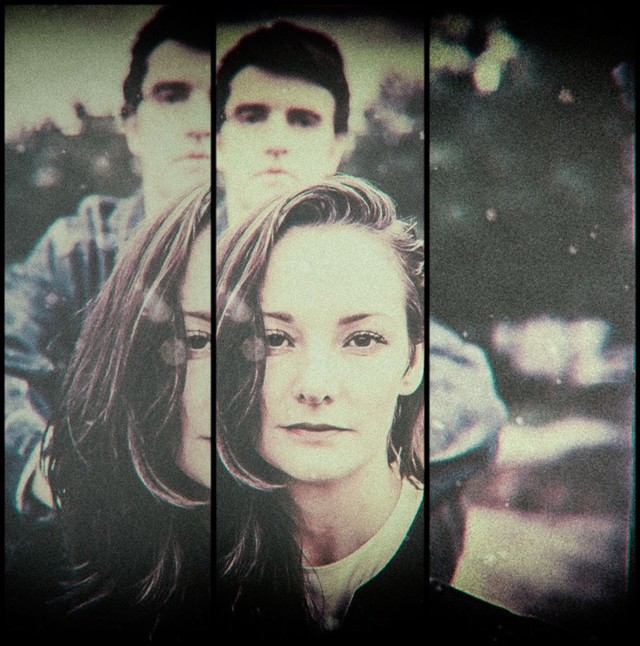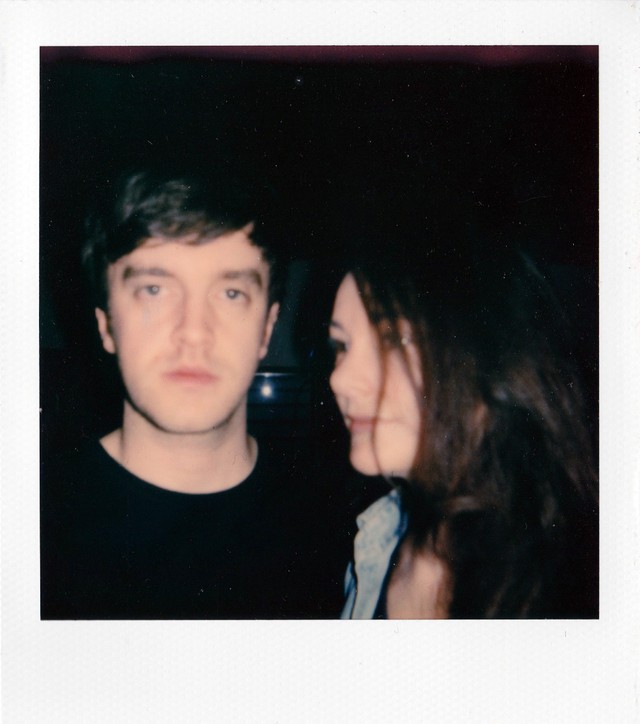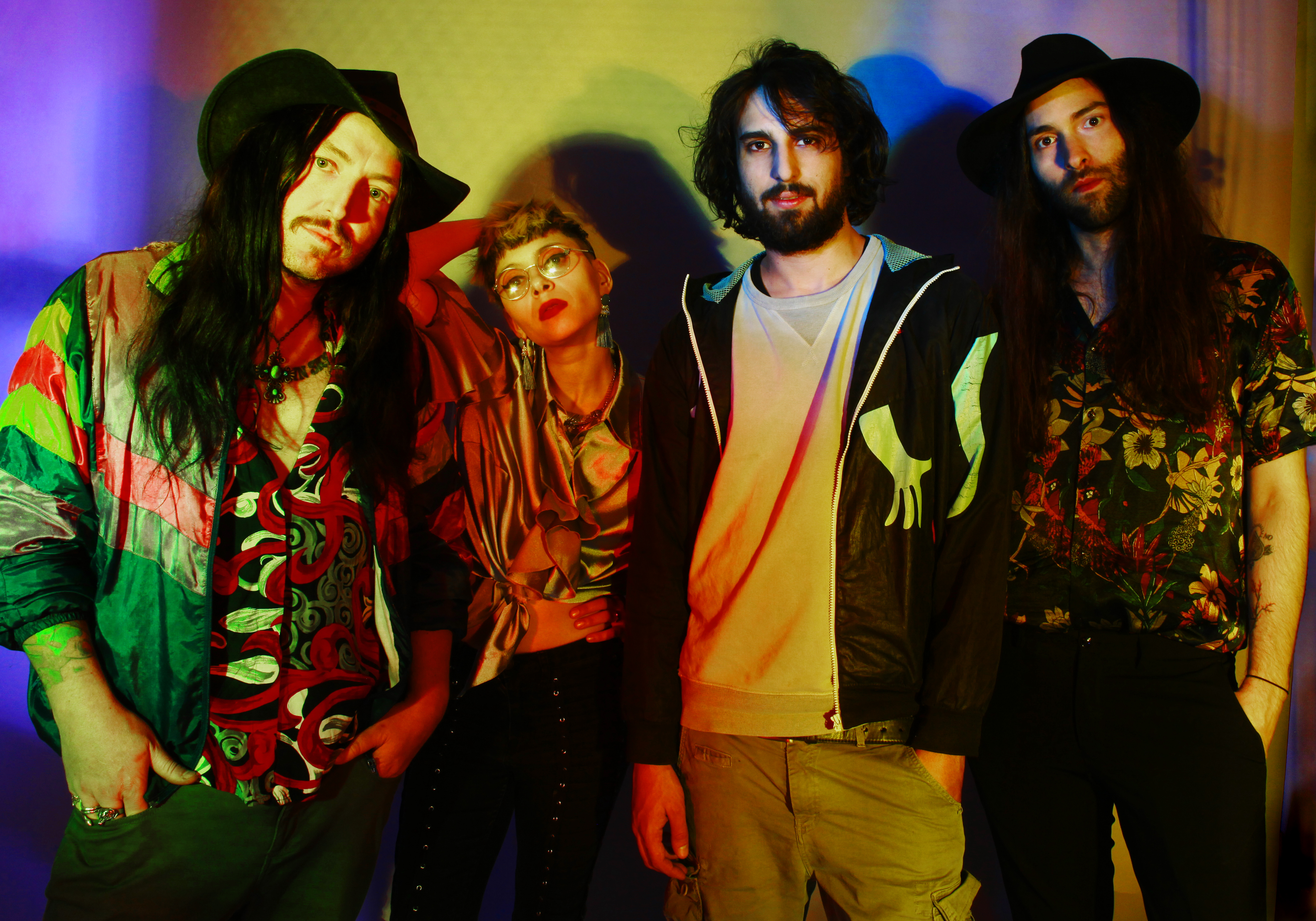Perlee are an Irish-bred dream-pop duo based in Berlin. Made up of Saramai Leech and Cormac O’Keefe, their first release ‘Chains of Coral/Feelings of Plenty’ is out today. Saramai sits down with Maija Sofia to discuss her creative process, her inspirations and Perlee’s plans for the future. Catch them tonight in The Grand Social Ballroom as part of Ireland Music Week.
So having lived in both rural Ireland and Berlin, do you think both of these geographical locations have influenced your music? Listening to the songs it feels like there’s a sense of rural wilderness but also a kind of urban feeling there as well.
Saramai: Yes, so in Kells, in the middle of nowhere, we weren’t total hermits but we did have a kind of mental and creative space, because we were by ourselves we could write and play as much as we wanted. I think that space allowed us to find a voice. We both have a shared vision for the sound that we don’t even have to talk about and I think Kells gave us that. Then Berlin did something to that, shook it up like a cocktail and I think there’s a bit more grit or complexity in what we’ve written since we got to Berlin. It’s slightly less naive or something.
Has being in Berlin given you new opportunities, in terms of allowing you to meet new people to collaborate with and having new places to play?
Definitely. Berlin is so big, we’ve never experienced living in a city so big before. Suddenly we’re in a city with 3 million people, so we can go out every night of the week and there will be venues to play to 50-100 new people on any night of the week. Obviously there might not always be that many people there, but you constantly have the opportunity to try stuff. I think that’s allowed us to not get hung up on the logistics or the mechanics of gigging, and just focus on how the songs come across instead. Every gig I would just try something different, and Cormac did too, and those very slow changes just kind of developed into a signature.
How has it been for you transitioning from being a solo artist into a more collaborative practice? With Cormac but also with other collaborators like A.S. Fanning and O Emperor’s Brendan Fennessy?
It’s been interesting and super-challenging. As a solo artist you don’t have to articulate anything, only to yourself. It helps that me and Cormac are married and have been together for 12 years, we’ve been playing music since the beginning, but to go one step further and actually write together was hard, even painful at the beginning, you have to be so open and vulnerable. I think in Kells we found a way to tap into that and to know at what stage of songwriting to be gentle or not overly critical, and to allow ideas to come to their fruition before we had to sit back and think, how can this be better? Writing by yourself can be so automatic, so the rewards are so great when you can find that with somebody, but it is a difficult process – you have to leave your ego at the door. Collaborations with AS Fanning and Brendan is just exciting, it’s the fun part, because we’ve already done the hard work on writing the songs. It’s exciting to suddenly have drums and bass to fill out the sounds we hear in our heads without trying fill up all the space with just voice.
Why the choice to record to tape? The songs have a lovely warmth to them. A lot of electronic music can feel quite cold and distant but your songs have retained a kind of intimacy, I wonder if this has to do with the analogue recording?
So a lot of the decisions to do with our work are just totally gut-led. It’s intentional but maybe from a more subconscious kind of place. It’s more about feeling out what’s right for the songs. So we played in Dublin last year, at HWCH, and Julie (McLarnon) was at it and she contacted us afterwards. We went to her studio twice to have pre-production meetings and it just felt right. The pre-recording decision-making was important. Digital recording can sound so slick and cold at times, and even though we are in that electronic world, we wanted a kind of folkiness, to have a warmth or a humanity to it.
I noticed one review likened your live set to something that might be in a David Lynch film. I feel like music reviewers love to jump to Twin Peaks comparisons if a band has any kind of dreamlike sound, but your music does have a real cinematic, almost visual quality, and I was wondering if there are things like cinema or visual art that play a part in inspiring your writing/recording process?
I love film but I think it’s more books and poetry that influence me, and other artists that we’re listening to. When I think of the songs I do think about them visually, I try to think of them in terms of colour or form, and a really strong feeling that goes with that image. But in terms of writing, I think a lot of it comes from personal experience, and whatever we’ve been reading helps to put form on those feelings. Cormac reads a lot of Kevin Barry, so that kind of sense of hyper-real abstraction comes into play a lot. I like a lot of weird science books like quantum mechanics and like super-abstract stuff that I don’t fully understand, I just love how when you go really far into a subject it becomes like magic, there’s a sense of wonder in the particular.
But we liked that David Lynch reference, because I always want our gigs to feel like you’re watching a film, to create a kind of world.
Yes, and as overused as David Lynch comparisons in music are, the first time I saw Perlee play, I just thought, oh my god, they’re like one of the bands playing in the new Twin Peaks, the music just has that atmosphere.
Yes! Thank you, we love David Lynch, obviously. I think my favourite director is Wes Anderson though, for his sense of humour, even if our music isn’t really of that world.
And how was it working in a studio in East Berlin that used to be a Stasi HQ? What was the atmosphere like in there?
It was so weird. It’s a massive building in old East Berlin, the scale of buildings in Berlin is just unfathomable. My understanding of its history is that the Soviets used it for armaments during the war, and after the war, it was used by the Stasi. It’s very strange, the first time I was there I found it suffocating. It feels like a prison or a submarine. I went there first to record with our friends Rufus and Jess, to put some keys and guitar down. I didn’t like it at first, but that’s the amazing thing about Berlin, they just use strange spaces and allow or invite artists to come in to reappropriate space in interesting ways, to reclaim spaces. So the building has been transformed into a whole make-believe world, with amazing wallpaper and prints, and when it was suggested we go back in there to mix, we jumped at it. There’s an amazing post-production room in there. It’s an exciting place but it is heavy. That’s the thing with Berlin, you’re never too far away from thinking about its history.
Finally, what are your plans for the near future?
We’ll have a four-track release in February on digital and vinyl, and we’ll have shows in Berlin and Ireland to coincide with that. Our dream is an album, but we’ve decided not to rush it, it’s been an exercise in humility, slowing down, but I feel like we’re writing better songs as we go on. So an album is on the cards after the EP.
Perlee’s double A-side ‘Chain of Coral/ Feelings of Plenty’ comes out today (October 4th 2019) on Greenbay Records. They play The Grand Social Ballroom tonight at 10pm for Ireland Music Week.







